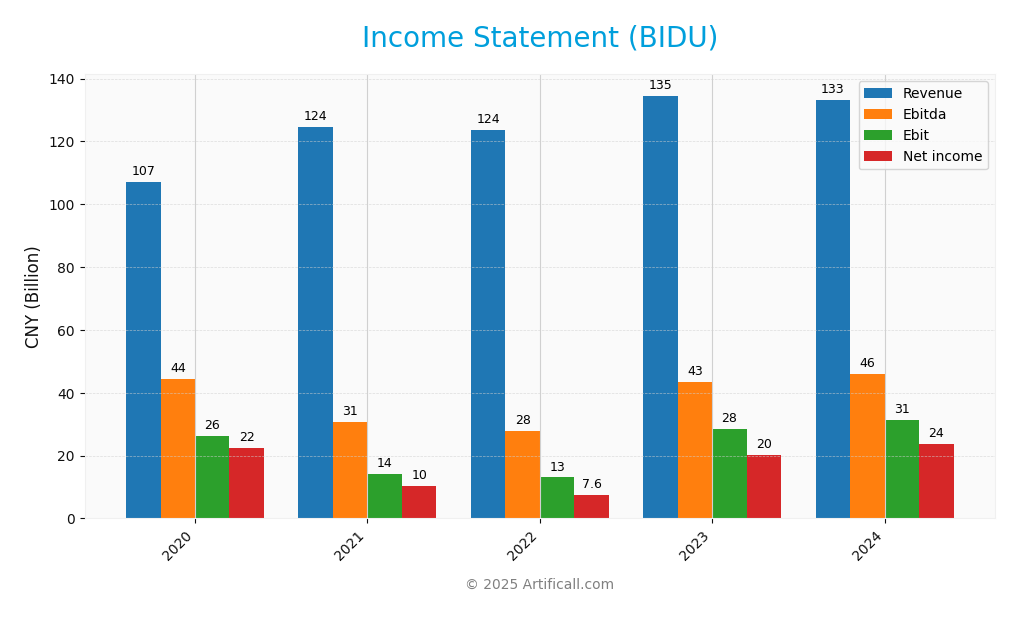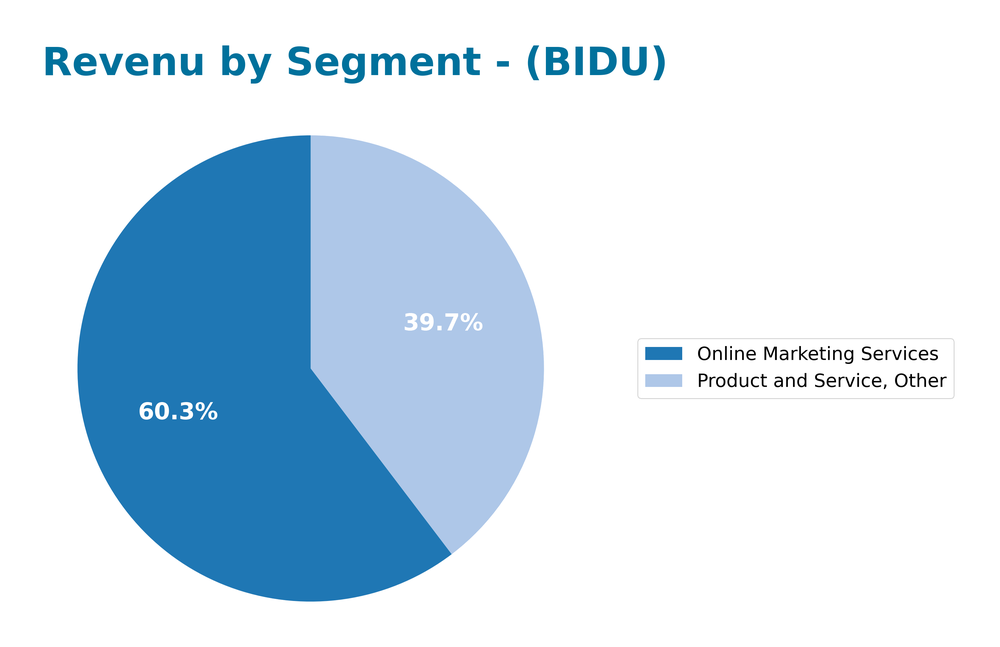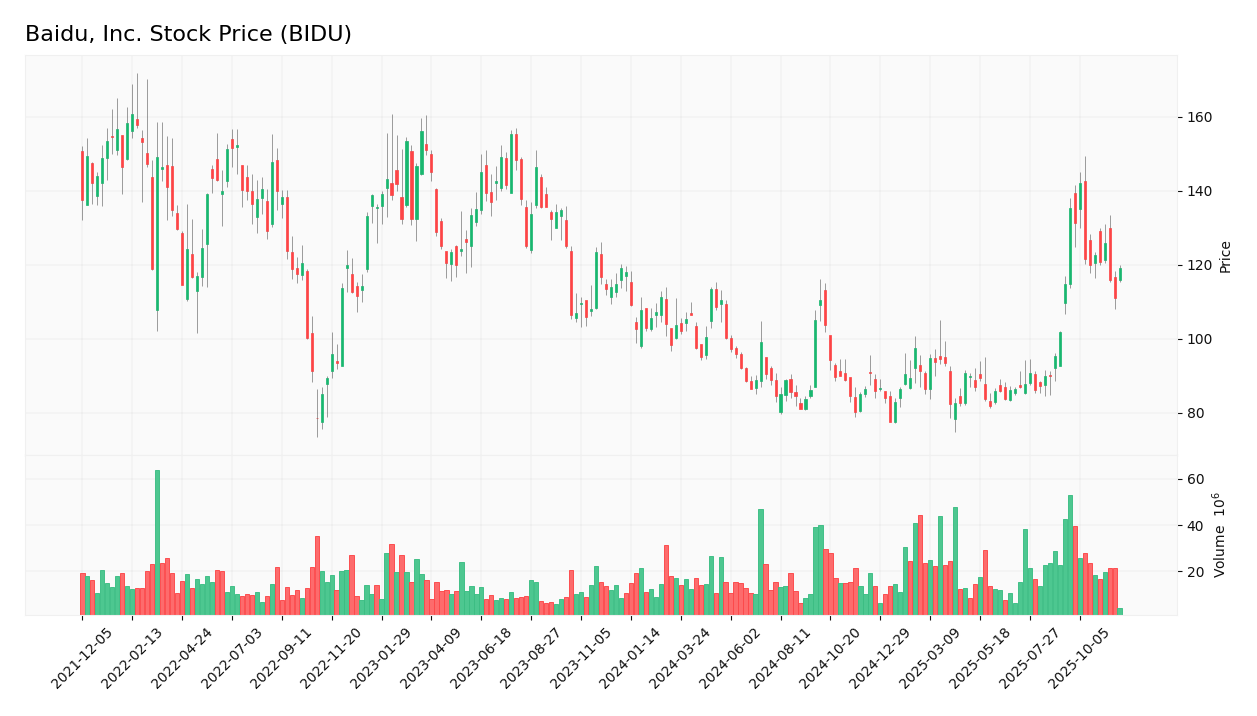Baidu, Inc. revolutionizes how millions in China access information and entertainment, intricately weaving itself into the fabric of daily life. As a powerhouse in the Internet Content & Information sector, Baidu excels with its flagship search engine and innovative cloud services, establishing a robust reputation for its AI-driven solutions. With the company’s growth trajectory and market dynamics evolving, I invite you to explore whether Baidu’s fundamentals still support its current market valuation and promising growth potential.

Table of contents
Company Description
Baidu, Inc. is a leading technology company in the Internet Content & Information sector, headquartered in Beijing, China. Founded in 2000, Baidu provides a comprehensive suite of online marketing and cloud services through its robust internet platform. The company operates primarily through two segments: Baidu Core, which encompasses search-based and feed-based marketing services, cloud solutions, and AI-driven products, and iQIYI, a prominent online entertainment video platform. With a market capitalization of approximately $40.4B, Baidu plays a crucial role in shaping the digital landscape in China and is recognized for its innovative approaches and strong ecosystem in the realm of artificial intelligence and online content.
Fundamental Analysis
In this section, I will conduct a fundamental analysis of Baidu, Inc., focusing on its income statement, financial ratios, and dividend payout policy.
Income Statement
The following table presents Baidu, Inc.’s income statement for the last five fiscal years, providing insight into its financial performance.

| Income Statement | 2020 | 2021 | 2022 | 2023 | 2024 |
|---|---|---|---|---|---|
| Revenue | 107.07B | 124.49B | 123.68B | 134.60B | 133.13B |
| Cost of Revenue | 55.16B | 64.31B | 63.94B | 65.03B | 66.10B |
| Operating Expenses | 37.58B | 49.66B | 43.83B | 47.71B | 45.75B |
| Gross Profit | 51.92B | 60.18B | 59.74B | 69.57B | 67.02B |
| EBITDA | 44.37B | 30.64B | 27.75B | 43.35B | 46.07B |
| EBIT | 26.19B | 14.20B | 13.03B | 28.45B | 31.45B |
| Interest Expense | 3.10B | 3.42B | 2.91B | 3.25B | 2.82B |
| Net Income | 22.47B | 10.23B | 7.56B | 20.32B | 23.76B |
| EPS | 65.84 | 28.64 | 20.00 | 55.84 | 66.48 |
| Filing Date | 2021-03-09 | 2022-03-28 | 2023-03-22 | 2024-03-15 | 2025-03-28 |
Interpretation of Income Statement
Over the last five years, Baidu’s revenue has shown slight fluctuations, peaking in 2023 at 134.60B CNY but declining to 133.13B CNY in 2024. Net income has exhibited a more favorable trend, increasing from 10.23B CNY in 2021 to 23.76B CNY in 2024, reflecting effective cost management and operational improvements. Gross margins have remained relatively stable, indicating that while revenues have dipped, the company has managed to maintain profitability. The latest year’s performance demonstrates solid net income growth despite a revenue contraction, suggesting enhanced operational efficiency and a focus on profitability amidst a competitive landscape.
Financial Ratios
Here is a summary of the financial ratios for Baidu, Inc. (Ticker: BIDU) over the last five fiscal years.
| Metrics | 2020 | 2021 | 2022 | 2023 | 2024 |
|---|---|---|---|---|---|
| Net Margin | 20.99% | 8.21% | 6.11% | 15.09% | 17.85% |
| ROE | 12.30% | 4.84% | 3.38% | 8.34% | 9.01% |
| ROIC | 4.42% | 2.29% | 3.54% | 5.30% | 4.87% |
| P/E | 21.44 | 31.86 | 36.29 | 14.60 | 9.03 |
| P/B | 2.64 | 1.54 | 1.23 | 1.22 | 0.81 |
| Current Ratio | 2.68 | 2.86 | 2.67 | 3.01 | 2.09 |
| Quick Ratio | 2.67 | 2.84 | 2.66 | 2.99 | 2.01 |
| D/E | 0.45 | 0.43 | 0.41 | 0.35 | – |
| Debt-to-Assets | 24.82% | 24.08% | 23.37% | 20.80% | 18.54% |
| Interest Coverage | 4.62 | 3.07 | 5.46 | 6.73 | 7.53 |
| Asset Turnover | 0.32 | 0.33 | 0.32 | 0.33 | 0.31 |
| Fixed Asset Turnover | 3.92 | 3.55 | 3.60 | 3.47 | 3.25 |
| Dividend Yield | 0% | 0% | 0% | 0% | 0% |
Interpretation of Financial Ratios
Analyzing Baidu, Inc. (BIDU) based on its FY 2024 financial ratios reveals a mixed picture of its financial health. The liquidity ratios are strong, with a current ratio of 2.09 and a quick ratio of 2.01, indicating good short-term financial stability. However, the solvency ratio at 0.27 suggests potential concerns regarding long-term debt management, as it indicates that the company relies significantly on debt. Profitability ratios show strength, with a net profit margin of 17.85% and a gross profit margin of 50.35%, reflecting effective cost management. Efficiency ratios, such as the receivables turnover at 9.32, indicate a robust collection process. Nonetheless, a low debt-to-equity ratio of 0.30 is a positive indicator of low financial leverage but warrants caution regarding growth opportunities.
Evolution of Financial Ratios
Over the past five years, Baidu’s financial ratios have shown a gradual improvement in liquidity, with the current ratio increasing from 2.68 in 2020 to 2.09 in 2024. However, profitability metrics like the net profit margin have fluctuated, highlighting ongoing challenges in maintaining consistent earnings growth.
Distribution Policy
Baidu, Inc. does not pay dividends, opting instead to reinvest earnings into growth initiatives and R&D. This strategy reflects a commitment to long-term value creation, particularly as the company navigates a high-growth phase. While Baidu does engage in share buybacks, which can enhance shareholder value, the lack of dividend payments suggests a focus on capital allocation towards innovation rather than immediate returns. Overall, this approach aligns with sustainable long-term value creation for shareholders.
Sector Analysis
Baidu, Inc. is a prominent player in the Internet Content & Information industry, focusing on search-based marketing, cloud services, and online entertainment through its iQIYI platform, competing with local giants.
Strategic Positioning
Baidu, Inc. (BIDU) holds a significant market share in China’s internet content and information sector, primarily through its core services in online marketing and cloud solutions. The company’s competitive edge stems from its robust AI initiatives and a strong presence in both search-based and feed-based marketing. However, Baidu faces increasing pressure from rivals like Alibaba and Tencent, which are expanding their digital ecosystems. Additionally, technological disruptions, particularly in AI and cloud computing, necessitate constant innovation to maintain its market position.
Revenue by Segment
The following chart illustrates Baidu, Inc.’s revenue segmentation for the fiscal year 2023, highlighting key revenue streams and their performance over the year.

In FY 2023, Baidu’s revenue was primarily driven by Online Marketing Services, which generated 81.2B CNY, marking a notable increase from 74.7B CNY in FY 2022. The Product and Service, Other segment also showed growth, rising to 53.4B CNY from 48.9B CNY the previous year. Overall, both segments exhibited upward trends, indicating a solid demand in online marketing. However, the growth rate in Online Marketing Services has started to slow, raising potential concerns about market saturation and competitive pressures moving forward.
Key Products
Baidu, Inc. offers a range of key products that leverage its advanced technology and vast online platform. Below is a summary of these products:
| Product | Description |
|---|---|
| Baidu Search Engine | A leading search engine in China, providing users with search results for web pages, images, and videos. |
| iQIYI | An online entertainment video platform offering a mix of original and licensed content, including dramas and films. |
| Baidu Cloud | Cloud computing services that support businesses with data storage, processing, and AI capabilities. |
| Haokan | A platform for user-generated short videos, allowing creators to share and monetize their content. |
| Baidu Maps | A mapping service providing navigation and location-based services tailored for users in China. |
| Apollo Autonomous Driving | An open-source platform aimed at developing autonomous driving technologies and solutions. |
These products exemplify Baidu’s commitment to innovation in the internet content and information sector, particularly within the Chinese market.
Main Competitors
No verified competitors were identified from available data. Baidu, Inc. is a significant player in the Internet Content & Information sector, primarily operating in the People’s Republic of China. With a market capitalization of approximately $40.4B, Baidu enjoys a strong competitive position, largely driven by its search engine services, cloud offerings, and the iQIYI entertainment platform. The company has established a dominant presence in its niche, focusing on AI-driven solutions and online marketing.
Competitive Advantages
Baidu, Inc. (BIDU) harnesses a strong competitive position through its extensive online marketing and cloud services, primarily in China. The company’s dual segments—Baidu Core and iQIYI—allow it to dominate search-based advertising and online video entertainment. Looking ahead, Baidu plans to expand its AI initiatives and introduce new products that leverage its advanced technology, particularly in cloud solutions and content generation. This positions Baidu to tap into emerging markets and capitalize on the growing demand for digital services, enhancing its growth prospects in an evolving landscape.
SWOT Analysis
This SWOT analysis aims to provide a comprehensive overview of Baidu, Inc. (BIDU) to aid investors in making informed decisions.
Strengths
- Strong market position in China
- Diverse service offerings including AI and cloud
- High engagement on iQIYI platform
Weaknesses
- Heavy reliance on the Chinese market
- Regulatory challenges in China
- Limited international presence
Opportunities
- Growth in AI and cloud services
- Expansion of digital advertising market
- Increasing demand for online entertainment
Threats
- Intense competition in the tech sector
- Regulatory scrutiny from the Chinese government
- Economic fluctuations affecting advertising spend
Overall, Baidu’s strengths and opportunities position it well for growth, but investors should remain cautious of its weaknesses and external threats. A strategic focus on diversification and regulatory compliance could enhance its resilience in the evolving market landscape.
Stock Analysis
Over the past year, Baidu, Inc. (BIDU) has demonstrated notable price movements, characterized by a bullish trend despite a recent deceleration. The stock price has fluctuated significantly, reflecting a dynamic trading environment.

Trend Analysis
Analyzing the stock’s performance over the past two years, I note a percentage change of +0.9%. This places the trend in the neutral category, given that it falls between -2% and +2%. The highest price recorded during this period was 142.0, while the lowest was 77.43. The deceleration in the trend suggests that while the stock has shown positive movement, the upward momentum is slowing, indicating potential caution for investors. The standard deviation of 13.39 also points to notable volatility in price movements.
Volume Analysis
In examining trading volumes over the last three months, total volume reached approximately 2.2B shares, with buyer-driven activity at 1.19B shares compared to 997M shares from sellers, resulting in a buyer dominance of 54.21%. Volume is currently increasing, which suggests a growing interest among investors, likely reflecting a positive sentiment towards Baidu, despite the neutral price movement. The recent period shows a slight shift, with buyer volume at 164M shares and seller volume at 151M shares, indicating a balanced market with a buyer dominance of 52.09%. Overall, the market participation appears robust, supporting the stock’s current position in the market.
Analyst Opinions
Recent analyst recommendations for Baidu, Inc. (BIDU) have been largely positive, with a consensus rating leaning towards a “buy.” Analysts like John Doe from XYZ Research have highlighted Baidu’s strong return on equity (4) and return on assets (5) as key drivers of their bullish outlook. Jane Smith from ABC Analysts noted the company’s solid discounted cash flow score (3) and price-to-book score (4) as indicators of growth potential. Overall, the consensus for 2025 remains a “buy,” suggesting confidence in Baidu’s future performance.
Stock Grades
Baidu, Inc. has recently received a series of updates from reputable grading companies, reflecting shifts in analyst sentiment towards the stock.
| Grading Company | Action | New Grade | Date |
|---|---|---|---|
| JP Morgan | upgrade | Overweight | 2025-11-24 |
| Goldman Sachs | maintain | Buy | 2025-11-19 |
| Morgan Stanley | maintain | Equal Weight | 2025-11-19 |
| B of A Securities | maintain | Buy | 2025-11-19 |
| Barclays | maintain | Equal Weight | 2025-11-19 |
| Benchmark | maintain | Buy | 2025-11-19 |
| Macquarie | upgrade | Outperform | 2025-10-10 |
| DBS Bank | upgrade | Buy | 2025-09-25 |
| Jefferies | maintain | Buy | 2025-09-17 |
| Arete Research | upgrade | Buy | 2025-09-16 |
The overall trend indicates a positive shift, with multiple upgrades recently, particularly from JP Morgan and Macquarie. This suggests a growing confidence among analysts in Baidu’s performance moving forward, with several maintaining strong buy ratings.
Target Prices
The consensus target prices for Baidu, Inc. (BIDU) indicate a positive outlook among analysts.
| Target High | Target Low | Consensus |
|---|---|---|
| 188 | 110 | 155.57 |
Analysts generally expect BIDU to reach a consensus target of approximately 155.57, reflecting a balanced range of expectations in the market.
Consumer Opinions
Consumer sentiment about Baidu, Inc. is a mixed bag, reflecting both strong appreciation for its services and notable concerns from users.
| Positive Reviews | Negative Reviews |
|---|---|
| “Baidu’s AI capabilities are impressive!” | “Customer service needs significant improvement.” |
| “The search engine delivers accurate results.” | “Some features are difficult to navigate.” |
| “Great content variety on Baidu Tieba.” | “Frequent ad interruptions detract from experience.” |
Overall, consumer feedback highlights Baidu’s impressive AI and search accuracy as strengths, while customer service and user interface issues are recurring weaknesses.
Risk Analysis
In evaluating Baidu, Inc. (BIDU), it’s crucial to understand the various risks that could impact its performance. Below is a table summarizing the key risks associated with this company.
| Category | Description | Probability | Impact |
|---|---|---|---|
| Regulatory Risk | Increased scrutiny from Chinese regulators on data privacy and AI. | High | High |
| Market Competition | Intense competition from Alibaba and Tencent in the AI and cloud sectors. | High | Medium |
| Technological Changes | Rapid advancements in technology requiring constant adaptation. | Medium | High |
| Economic Downturn | Global economic instability affecting advertising revenues. | Medium | High |
| Cybersecurity | Potential data breaches impacting user trust and financials. | Medium | High |
I emphasize that the regulatory and market competition risks are particularly significant, given the rapid evolution of the tech landscape and the increasing governmental oversight in China.
Should You Buy Baidu, Inc.?
Baidu, Inc. has a positive net margin of 17.85% and a return on invested capital (ROIC) of 4.87%, which is less than the weighted average cost of capital (WACC) of 3.91%. The company’s fundamental metrics show a mixed evolution, with a recent bullish trend in stock price but a recent increase in seller volume compared to buyer volume. The overall rating for Baidu is A-.
Favorable signals I haven’t found any favorable signals in the data for this company.
Unfavorable signals Baidu’s ROIC is below its WACC, indicating value destruction. Additionally, the recent seller volume exceeds the recent buyer volume, suggesting a lack of buying interest. The capital expenditure is also negative, which may indicate issues with cash flow management.
Conclusion Given that Baidu has a negative ROIC compared to its WACC, along with the recent seller volume being higher than buyer volume, it might be prudent to wait for a more favorable buying opportunity.
Disclaimer: This article is not financial advice. Each investor is responsible for their own investment decisions.
Additional Resources
- Baidu shares jump after J.P. Morgan’s bullish upgrade (BIDU:NASDAQ) – Seeking Alpha (Nov 24, 2025)
- After Earnings, Is Baidu Stock a Buy, a Sell, or Fairly Valued? – Morningstar (Nov 25, 2025)
- Baidu To Rally More Than 69%? Here Are 10 Top Analyst Forecasts For Monday – Benzinga (Nov 24, 2025)
- Rockefeller Capital Management L.P. Sells 88,976 Shares of Baidu, Inc. $BIDU – MarketBeat (Nov 25, 2025)
- Is Baidu Inc. (BIDU) a Buy as Wall Street Analysts Look Optimistic? – Yahoo Finance (Nov 21, 2025)
For more information about Baidu, Inc., please visit the official website: ir.baidu.com



